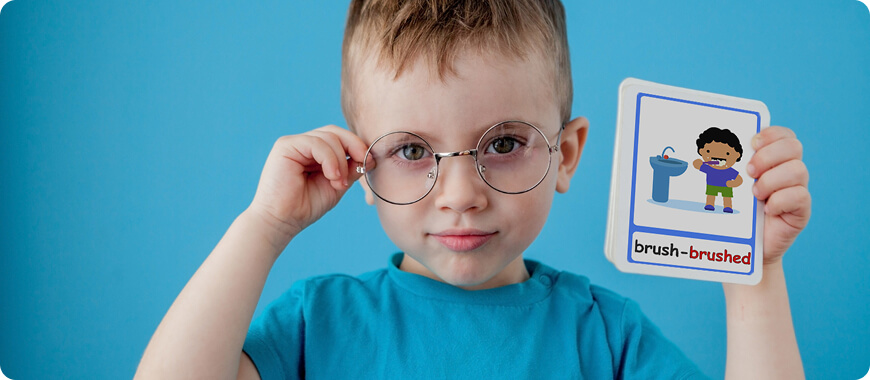If you’ve ever heard your child say, “I eated pizza” or “We goed to the park,” you’re not alone. Irregular verbs are one of the most common — and completely normal — hurdles in early English learning. The good news? You don’t need boring drills or grammar textbooks to help your child master them. In fact, with the right approach, irregular verbs can become one of the most fun parts of learning English.
At Learnlink, we’ve spent years helping children aged 4–14 fall in love with English — not through repetition, but through play, stories, songs, and real-life connection. In this guide, you’ll discover practical, joyful ways to teach irregular verbs that actually stick. No stress. No tears. Just progress — and plenty of smiles.
What Are Irregular Verbs?
Irregular verbs are action words that don’t follow the standard “-ed” rule when talking about the past. While regular verbs like play → played or jump → jumped are predictable, irregular verbs change in unexpected ways: go → went, eat → ate, see → saw.
For young learners, this can feel confusing — especially when they’ve just learned that “add -ed for the past!” only to be told, “...except for these 200 verbs.”
But here’s the secret: kids don’t need to memorise lists. They need context, rhythm, and repetition through play.
Regular vs. Irregular Verbs: Spot the Difference!
Tip for parents: Point out the pattern gently. Say, “Most verbs add -ed… but some special ones change completely! Let’s learn the cool ones together.”
When Do We Use Irregular Verbs?
Irregular verbs appear every time we talk about the past — and that’s often! From bedtime stories to dinner-table chats, your child is already using (or trying to use) them daily.
Talking About Yesterday: Past Tense in Daily Life
Phrases like “I had breakfast,” “She saw a dog,” or “We went swimming” all rely on irregular verbs. These aren’t just grammar rules — they’re tools for sharing experiences.
Common Situations Kids Use Irregular Verbs
- Telling stories: “I found a bug!”
- Answering questions: “What did you do at school?” → “I made a drawing!”
- Describing weekend fun: “We ate ice cream and saw a movie!”
The more your child hears and uses these verbs in real conversations, the more natural they become.
Why Irregular Verbs Are Tricky
Irregular verbs break the rules — and young minds thrive on patterns. When a child learns that “walk → walked,” it’s jarring to hear “run → ran.” This mismatch can lead to hesitation or avoidance.
But here’s the truth: making mistakes like “I goed” is a sign of progress, not failure. It means your child understands the concept of past tense — they’re just applying the regular rule too broadly. With gentle guidance and playful exposure, they’ll adjust naturally.
Common Rules of Irregular Verbs
While irregular verbs don’t follow one single rule, many fall into helpful groups:
1. Verbs that stay exactly the same
These look and sound identical in the present and past tense — no change at all!
- cut → cut
- hit → hit
- put → put
- let → let
- shut → shut
“I cut my paper yesterday!” — simple and stress-free.
2. Verbs that change a vowel inside
The middle sound shifts, often creating a clear “before and after” sound.
- sing → sang
- drink → drank
- begin → began
- swim → swam
- ring → rang
Try saying them aloud: “I sing → I sang!” The rhythm helps it stick.
3. Verbs that become a completely different word
These are the “magic” or “transformer” verbs — they change shape entirely.
- go → went
- be → was / were
- do → did
- have → had
- say → said
Perfect for storytelling: “Yesterday, I went to space!”
4. Verbs that end in -ought or -aught
A small but useful group with a distinctive “-awt” sound.
- buy → bought
- think → thought
- bring → brought
- catch → caught
- teach → taught
Top 20 Must-Know Irregular Verbs for Young Learners
Focus on high-frequency verbs your child will actually use. Here’s a kid-friendly reference:
Storytelling Magic: Teach Irregular Verbs Through Mini-Stories
Children remember stories far better than lists. Create simple tales using 3–5 irregular verbs:
“Yesterday, Leo went to the forest. He saw a big bear! He got scared, so he ran home and told his mum.”
Ask your child to retell the story — or make up their own! Use puppets, drawings, or toys to bring it to life.
Playful Games That Stick
Verb Charades: Act It Out!
Write base verbs like go, eat, see, or take on small cards. A child picks one, acts it out (e.g., pretending to eat), then says the sentence in the past tense: “I ate an apple!” Great for energy, laughter, and instant practice.
Irregular Verb Bingo
Make simple bingo cards filled with past tense verbs (went, ate, saw, took). Call out base forms (“go!”), and kids cover the matching past tense word (“went”). First to complete a line wins!
Memory Match: Base Form vs. Past Tense Cards
Create pairs of cards: one with the base verb (see), one with its past form (saw). Lay them face down. Kids flip two at a time trying to find matches. “I found eat and ate!” — perfect for visual memory and quiet focus.
Hands-On Activities for Kinesthetic Learners
- Verb Jump: Place verb cards on the floor. Say “Yesterday I ___!” and jump to the correct past tense.
- Time Machine Craft: Decorate a box as a “past tense machine.” Drop in base verbs, pull out past forms.
- Verb Treasure Hunt: Hide cards around the house. Find “go” → shout “went!”
Movement + language = deeper learning.
Top 3 YouTube Songs for Irregular Verbs (2025 Picks)
- “Irregular Verbs Song” by Maple Leaf Learning – Catchy tune with clear pronunciation.
- “Past Tense Party” by Super Simple Songs – Great for ages 4–7.
- “The Verb Rap” by BBC Learning English (Kids Edition) – Fun rhythm for older kids.
Play these during car rides or as brain breaks!
Ready to Make English Fun? Book a Free Trial Lesson Today!
You’ve got the tools. Now imagine your child learning irregular verbs with a friendly, certified teacher who turns every lesson into a game, story, or song.
At Learnlink, our tutors specialise in engaging, confidence-building lessons for children. No textbooks. No stress. Just real progress — through laughter, creativity, and connection.
Book your child’s free 25-minute trial lesson today.
Spaces fill fast — and the first step to fluent, joyful English is just one click away.
Because when learning feels like play, every verb — even the irregular ones — becomes an adventure.





.jpg)


